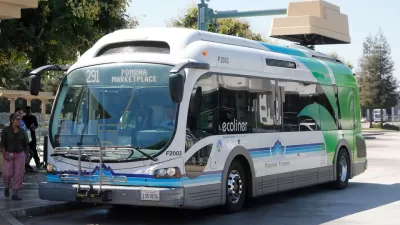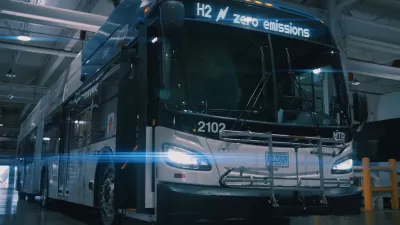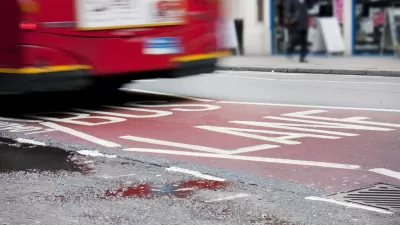To switch to fully electric bus fleets, transit agencies can invest in batteries and hydrogen fuel cells. Both have their advantages.

As more cities seek to minimize their use of fossil fuels, bus fleets are one obvious place to start. But should the buses of the future be powered by rechargeable battery or hydrogen fuel cell? "There isn't an obvious answer. Both are more environmentally friendly than fossil-fuel buses, and both can be cost-effective options," Daniel C. Vock writes.
Vock reports on two Illinois transit agencies that have made the switch. One of them, the Rock Island County Metropolitan Mass Transit District, went with batteries. "One concern for the agency was how the batteries would perform over the long haul. The battery technology is so new that the agency has had to rely on engineers' estimates about battery life rather than real-world testing," Vock writes. But so far, the buses have met or exceeded agency expectations.
The Champaign-Urbana Mass Transit District (MTD), by contrast, found the battery electric option lacking. Serving the students of the University of Illinois, who "expect buses to come frequently and run late into the night," MTD wanted engines that could match diesel's range. It also had qualms about recharging batteries on the power grid, which runs on coal in Champaign-Urbana. Currently, MTD plans to produce its own hydrogen.
In both cases, agencies will have to come to terms with upfront costs. Both the Rock Island County Metropolitan Mass Transit District and the Champaign-Urbana Mass Transit District defrayed some of that expense with federal grant money.
FULL STORY: Batteries or Hydrogen? Cities Weigh the Best Way for Buses to Go Electric

Alabama: Trump Terminates Settlements for Black Communities Harmed By Raw Sewage
Trump deemed the landmark civil rights agreement “illegal DEI and environmental justice policy.”

Study: Maui’s Plan to Convert Vacation Rentals to Long-Term Housing Could Cause Nearly $1 Billion Economic Loss
The plan would reduce visitor accommodation by 25% resulting in 1,900 jobs lost.

Planetizen Federal Action Tracker
A weekly monitor of how Trump’s orders and actions are impacting planners and planning in America.

Wind Energy on the Rise Despite Federal Policy Reversal
The Trump administration is revoking federal support for renewable energy, but demand for new projects continues unabated.

Passengers Flock to Caltrain After Electrification
The new electric trains are running faster and more reliably, leading to strong ridership growth on the Bay Area rail system.

Texas Churches Rally Behind ‘Yes in God’s Back Yard’ Legislation
Religious leaders want the state to reduce zoning regulations to streamline leasing church-owned land to housing developers.
Urban Design for Planners 1: Software Tools
This six-course series explores essential urban design concepts using open source software and equips planners with the tools they need to participate fully in the urban design process.
Planning for Universal Design
Learn the tools for implementing Universal Design in planning regulations.
Caltrans
Smith Gee Studio
Institute for Housing and Urban Development Studies (IHS)
City of Grandview
Harvard GSD Executive Education
Toledo-Lucas County Plan Commissions
Salt Lake City
NYU Wagner Graduate School of Public Service





























